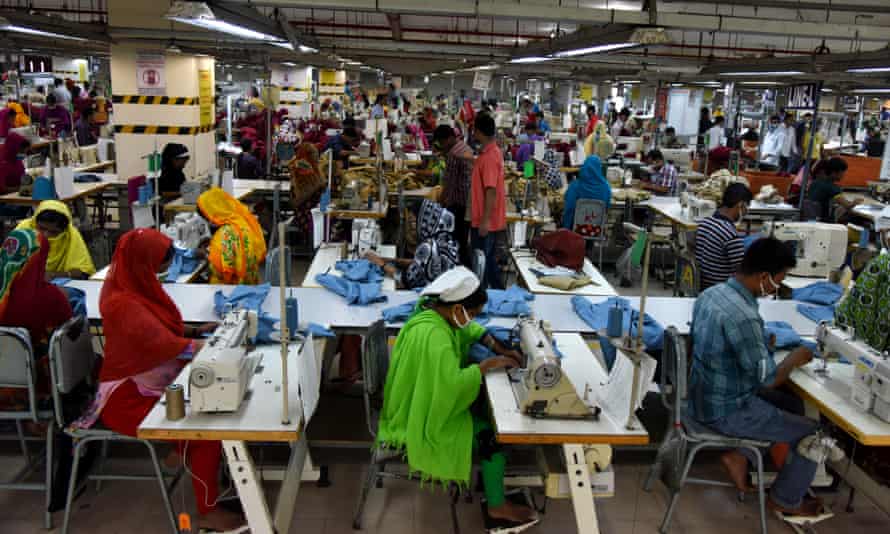Jason Choi Pre-season Stocking and Pricing Decisions for Fashion
The mode industry needs to fundamentally change in order to mitigate the ecology bear on of fast manner, experts accept said.
Apparel rental, better recycling processes, pollution control engineering science and the innovative employ of offcuts are among measures that could help, they said.
The researchers produced a study – pubished in the journal Nature Reviews Earth & Environs – into the environmental price of the industry, and how it needs to change to deal with some of the many associated problems.
While the figures are debated, the Intergovernmental Console on Climate change (IPCC) has calculated the fashion industry produces 10% of global carbon dioxide emissions every twelvemonth, while it is estimated to use around 1.5 trillion litres of water annually. Meanwhile concerns take been rising about pollution, from chemical waste to microplastics.
Amongst the developments deemed to be exacerbating the problems, is fast fashion – cheap clothes bought and bandage aside in rapid succession as trends change – such as the £one bikini sold past Missguided last year.

"It is really a global trouble," said Dr Patsy Perry, a co-author of the research from Manchester University.
Perry and an international grouping of colleagues point out that the global nature of the mode industry means dress may take travelled effectually the world several times during industry, while it is estimated that if iii% of garment transportation shifted from ship to air cargo – a burgeoning trend in the industry – it could outcome in over 100% more carbon emissions than if all garment transportation was by transport.
The team also points to the industry's water consumption, carbon dioxide emissions, material waste material, and use of chemicals – substances they say non simply pose environmental risks, simply wellness risks for those involved in the industry. "In 1 example, a single European textile-finishing company uses over 466g of chemicals per kilogram of textile," they write.
And while many garments are designed in the US or Eu, they are often produced in developing countries. The team says that not only increases fabric waste through poor communication of requirements, merely regulations around pollution are often less strict in the countries of manufacture. "The waste water is going out into freshwater streams and polluting the rivers that people are angling from [and] living from," said Perry.

The report stresses express natural resource mean the fashion industry must alter, and sets out a number of ways it could become greener, including embracing renewable energy and developing new methods for recycling, equally well as reducing the use of polyester – a non-biodegradable fibre, produced from petrochemicals, that dominates the manner industry.
They also argue the industry should focus on producing improve quality, long-lived items, while innovations like wearing apparel rental and new approaches to resale should exist scaled up.
But they add: "Consumers must understand fashion equally more of a functional product rather than amusement, and be ready to pay higher prices that account for the environmental impact of fashion."
Information technology is not the get-go time solutions to fast fashion accept been mooted. Last yr, MPs on the Ecology Inspect Committee (EAC) proposed a number of measures, including a 1p charge on each new item of article of clothing to fund improve recycling and collection. All were rejected by the government.

Libby Peake of the Green Brotherhood said the Great britain had a detail problem when information technology came to fast fashion.
"We buy more clothing per caput than any other country in Europe, including near twice as much every bit Italians, who are ameliorate known for their fashion sense," she said.
As well equally emphasising the need for improved quality and habiliment rental schemes, she said, the report highlighted the importance of ownership habiliment 2d paw. Manufacture-led initiatives to reduce environmental costs had been ineffective while consumption continued to rise.
"Boring mode is the only sustainable future for the industry and the planet," she said.
Acquit Somers, the co-founder of the campaign Fashion Revolution, also stressed the use of chemicals in the fashion industry, equally flagged past the new report, is of particular business, especially in clothes made outside the EU where it is hard to know what substances have been used.
Prof Steve Evans, an expert in industrial sustainability at Cambridge University, also welcomed the written report. But he said it was unclear what proportion of the manufacture'southward environmental impact was down to fast fashion per se. A central claiming for the "closed loop" manufacture was that unlike sectors, from production to retailing and recycling, must brainstorm to work together.
But Evans said a time to come where the rate of fibre production and disposal was lowered need not mean a dearth of new outfits, if garments were rented or re-sold. "It might be fast mode from the perspective of the fashionista," he said, "only it is boring from the perspective of the planet."
0 Response to "Jason Choi Pre-season Stocking and Pricing Decisions for Fashion"
Post a Comment